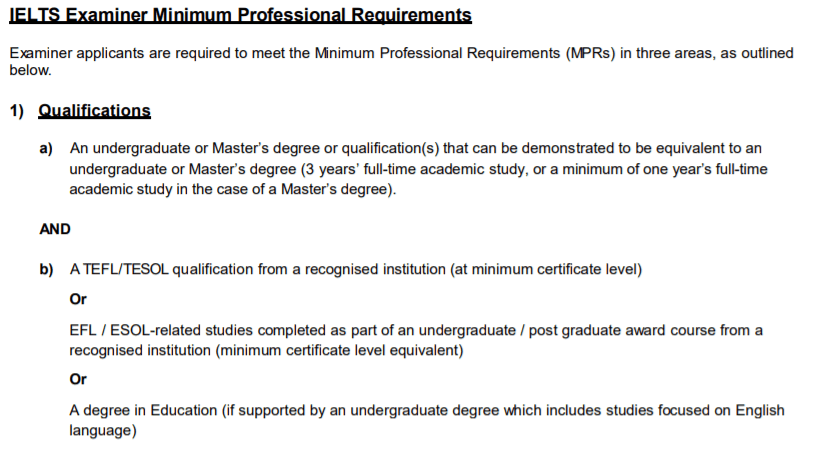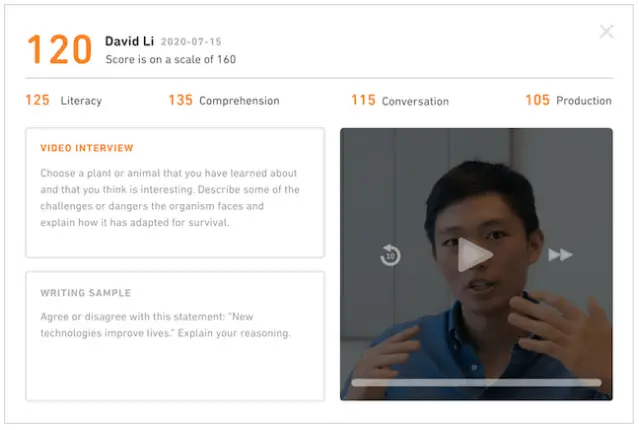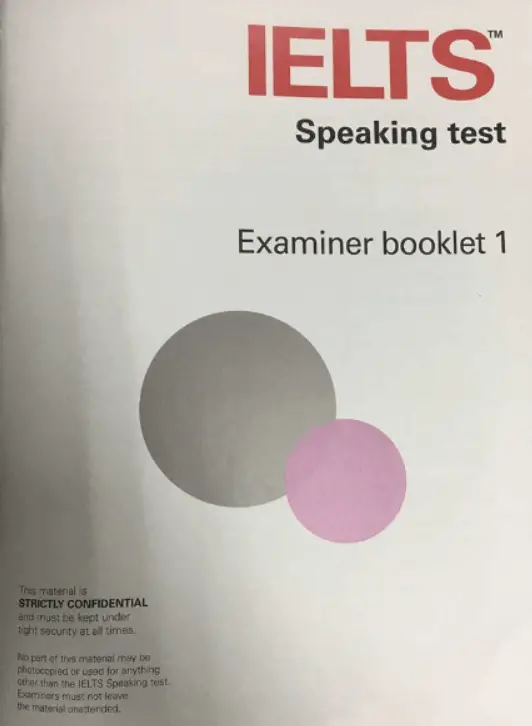This post is based completely on my own experiences of becoming an IELTS speaking examiner and working as one for the last couple of years. It has been a up and down ride and I will attempt to share a few of those with you throughout this post.
Becoming an IELTS examiner is quite straight forward. You need to look for vacancies on the main IELTS websites in your region and apply for openings as they appear. Next, go through the interview and training process and hope your application is successful.
Step 1: Apply
Of course, there are a few forms to fill in by way of application and if you pass this part of the process then you’ll be invited to a face to face interview. The bar did not seem to be terribly high to be honest. A degree and a CELTA or equivalent plus a few years teaching experience with good references seemed to be enough.

Step 2: Pass The Interview
If you are made of the right stuff and can answer questions such as ‘do you think it is important to have a good knowledge of meta language when assessing students?’ then you are probably going to go through to the next phase.
Step 3: Attend The Training Weekend
The next phase is a long weekends IELTS examiner training. For me this involved a Friday evening session to do an orientation session and to meet the other potential examiner’s.
To be perfectly honest, this was a bit of a waste of time because we had all been working during the week and quite frankly we were too tired for the session to be of any use. Just as an aside here, be aware that this long weekend is completely unpaid and you are expected to do this to show your commitment to becoming a IELTS Examiner.
This is actually a bit of a recurring theme for me and one of the reasons I am not sure I want to examine anymore. I feel that the British Council I work for always feels that they were above us employees and that they are doing us a favour. In reality I found them to be a very mediocre to organization to work for, more on that later though!
So, anyway, on the Saturday and Sunday you will essentially go through the protocol for the speaking exam. You will practice the scripts that examiners have to read from and you will practice reading the scripts and asking the questions to your fellow trainees following the correct procedure and timings.
IELTS are really keen for all examiners to be following the exact same procedure for all tests. This is just part and parcel of being an examiner, everything has to be done ‘just so’, so that all the candidates can get the same opportunity to impress as each other. If you don’t like this level of perfectionism then examining is not for you.
You will be told things like do not respond to candidates by saying yes or by using other informal utterances such as a uh hu, oh I see, or anything like that.
You basically have to be quite standoffish and rather unnatural in your maneuvering of the conversations. That said when you get used to it, it’s not that difficult and you realize that you are in complete control of the conversations and you can do what you like within the boundaries that you are given.

Step 4: The Examiner Assessment Test
The training will culminate in a test where you are supposed to prove that you can assess candidates effectively. All of the potential speaking examiners are sat down in a room together in their own little space and are presented with a tiny MP3 player with six different tracks on it.
Each track is a speaking tests from different candidates. Your task is to correctly assess the candidates in all four areas of the band marking criteria: lexical resource grammatical range accuracy and fluency and coherence.
To pass the test you need to get a minimum of 30 out of 36 at the exact correct band score. Fortunately, for me, I got 34 out of 36 correct and so proved myself ready to be an examiner.
Step 5: Your First Six Tests
After you have completed this you are invited to examine formally within the next month and you are permitted to do just six full interviews. The reason for this is just to make sure you are completely comfortable with the procedures and to check the accuracy of your examining one more.
Step 6: Congrats – You Made The Rota!
If everything goes okay you will then be free to join the main rota of IELTS speaking examiners which will be organized by your center coordinator.
From this point on you are basically on your own. Your availability and how much you examine is completely up to you although I highly recommend that you examine at least once a month for the first year of your time as an IELTS examiner.
The reason being that if you leave it longer than that or you don’t examine frequently your accuracy may suffer. You will essentially forget some of the nuances of examining and your gauge for the different levels may be off slightly.
Step 7: Continue To Survive Moderation
Essentially all the interviews that you conduct are recorded and they are sent away to a central moderator. A selection of your recordings are then listened to at random and checked against a central standard to see if you are indeed maintaining the IELTS standards.
If you are not then you are basically given a series of warnings before you are released from being an examiner. This will not come out of the blue as fairly regularly you will receive reports from the moderators as to how well you are doing.
Feedback regarding your examining comes back in two parts. You will receive feedback about how well you are adhering to the protocols of the test and secondly you’ll be checked to see if you are marking candidates correctly.
You need to do both of these accurately in order to continue examining. It is fairly common for IELTS examiners to be phased out over time and gradually slip away if they are not meeting the standards.
As far as IELTS organization is concerned they seem to think it is up to you the examiner to fix any issues that you have and there is no ongoing training to give any extra support or practice to anyone who is not doing very well.
Some people, however, do get the hang of it and examine often enough for it to become second nature, and for these people they can examine quite easily and enjoy doing so whilst making nice money.
Working as an examiner for me I found pretty annoying and actually quite tiring. Some afternoons I’ll be scheduled for 25 back-to-back interviews with paperwork to fill in between each interview and limited breaks.
I say limited breaks because if you make a mistake on any of the pieces of paper then you will end up doing it in your break time before the next candidate is scheduled to start.
Also, the quicker you do your tests the quicker you can go home. This is why lots of examiners simply work straight through their breaks and try to get them all over and done with.
After a full week working in a school teaching I find that to then give up my Saturday afternoon to follow a rather soulless interview procedure with a bunch of people I don’t know and whom I’m never going to meet again for 5 to 6 hours quite an arduous task.
However, it is something different to teaching and there is very little preparation, if any, required. Once you’re used to it, it can then be done almost automatically.
That is so long as you are not like me and your concentration waivers after the first few interviews and you start losing track of time, which is not great thing when you are supposed to be following strict protocols!
What is it like to be an IELTS examiner?
For many IELTS examiners who are ESL/TEFL teacher during the week then it is actually a welcome change. There is zero preparation to do, or marking to do afterwards and you do feel like your professional language assessment skills are valued.
That said, it takes a certain type of personality to be able to endure the monotony, follow the stringent guidelines required and to accept that you work for an organization that thinks rather too much of itself.
Working as an examiner I felt at times like I wanted to remind them that they don’t t own the English language. The IELTS system does not allow for differences of opinion.
Case in point: I remember one particular interview where the speaker was really good with native like fluency. It was like having a conversation with a friend and so I gave them band 8s and 9s. I do remember in part one of the interview though I asked the question ‘What facilities do you have near your house?’ To which the candidate paused, then ummed and erred a little before telling me about the local library, hospital, schools and parks.
To me, it seemed perfectly reasonable to pause for a moment before they replied. I felt as though the candidate was pausing so they could actually think about the facilities in their area.
However, three full months later I received an e-mail feedback form from the central moderators that I had graded the candidate too highly for fluency and they stated this as the example as to why I was wrong.
Now , if you take a look at the clipping below you will see that it says language related hesitation is a band 7 and content related hesitation is a band 8/9. I personally, looking at the candidate face to face in real conversation and based on my 20 years of ESL teaching experience felt that it was language based. But, oh know. Mr IELTS in head office disagrees because he just heard an ‘umm and an err’ and couldn’t see in the eyes of the candidate as I could.
So, as I said, three months later I got this feedback. What earthly point is there in giving anyone feedback three months after they have done something and it is the manner of the feedback too. They write as though they are the only ones that could be correct when of course this is a subjective issue, opinion based, so don’t just turn around and tell someone they are wrong when they are not even there!
I actually don’t mind examining, but when you get feedback of that pathetic nature it is just not helpful. The only way to get really good at giving the scores that IELTS thinking you should be giving is to listen to what they say as regards your judgment, not what you instinctively feel your judgment is.
So, you end up running everything through their filter and not giving scores you actually feel are more accurate. But, hey, if you can see through that then who cares I guess.
Although I personally examine for IELTS I do not want their system to succeed. It is over priced and exam technique plays too much of an important role in getting a good band score which means that the scores can be ‘manipulated’ by improving exam technique which is not the point of the test.
And don’t get me started on the cost! It’s over $200 per test and over half of the candidates have to take it at least twice! So, guess, what? It is in IELTS’ interest to make the test difficult to succeed in. Yes, yes, it needs to be stringent but I really do not think they are doing/have done enough to make the test user friendly. I mean it has been that same format for decades now…decades!
There is hope on the horizon now though, recently I went to a presentation by Duolingo about the language assessment system they are offering and which is already accepted by top US universities and is fully automated and online. It uses artificial intelligence to shape the questions you face to your ability level.

Essentially, it learns from your answers and sets level appropriate questions. The crucial part of this is that it is only $49! A massive undercut of the esteemed IELTS $200 plus plus price tag and bearing in mind what I have just told you about the accuracy of the IELTS test probably just as accurate!
A great feature of the Duolingo test is that it records a video of the candidate speaking. This enables the university to see candidates speaking for themselves and let them come to their own judgment about how good a person’s English is rather than getting a rather arbitrary band level of 1-9 to go on.
Time will tell I guess. The crucial factor being how long will it be before the UK immigration system accepts Duolingo or other such certificates as proof of a candidate’s language ability. I do sense bias against change though because obviously the British Council serves the same pay masters as UK immigration and they will absolutely not want to lose their juicy income from IELTS.
For now though, IELTS is a decent side income for TEFL teachers if you can learn to ignore the ridiculous feedback from moderators and you accept that you are working for a company that is, in the nicest possible way, a bit of a scam and rip off in some respects.
What does an IELTS examiner do?
An examiner follows the same set of protocols for every interview. They are supposed to uphold the assessment standards of IELTS and provide every candidate with the same opportunity to achieve.
The interview essentially goes like this. The interviewer will invite the candidate into the room who will take a seat and by this time the examiner has already started a recording of the interview
Next, the examiner will read the introductory scripts and take a look at the students identification which will normally be a passport and confirm all the necessary details.
They will then read the frame for part one of the speaking test. These questions are aimed at simply getting the student comfortable, relaxed and sharing their views about everyday life for them.
This section last for 4-5 minutes .The Examiner has to make sure it doesn’t go beyond this time. The examiner then goes on to read the frame for part 2 of the test. This essentially involves the candidates being handed a card with a series of bullet points on it indicating what they should talk about for the following 2 minutes.
The examiner will then hand over a piece of paper, pen and the prompt card. They will then time a one-minute preparation time for the candidates before asking them to start speaking for two minutes.
If they don’t speak for 2 minutes then the examiner will encourage them to speak for longer or ask them an additional question to get them talking again.
After completion they then will ask for the pen and paper back and ask one rounding off question to try and naturally end that part of the speaking test. Next they will move on to part three of the speaking test which is supposed to be a more natural conversation about more abstract issues.
The examiner has a choice of three blocks of questions each with four questions in them and these are open ended questions within which the Examiner has some freedom as to how they exactly pose the question.
Examiners should also continue to probe and ask questions about the candidate responses. This section lasts 4-5 minutes and the entirety of the tests should be concluded between 11 to 14 minutes in total.
The examiner then dismisses the candidates politely and once the candidate has left the room they will finish recording. They will then have few minutes to grade to the candidates, listen back to any sections of the recording if they wish to do so and fill in the relevant paperwork.

Can IELTS examiners teach IELTS?
IELTS examiners can also teach IELTS as long as they do not advertise the fact that they are an IELTS teacher, or give grades out as though they were doing an IELTS test. Other than that, they are free to teach IELTS as much as they want, using their insights and knowledge to good effect.
At this point you might also want to read my helpful guide on how to teach IELTS writing, here and/or how to teach IELTS online, here.
How do IELTS examiners mark speaking?
There is no secret to this, the full IELTS speaking band criteria are presented here and examiners use their best judgment based on their training and experience to determine where each candidate sits on the scales. An average band score is then worked out and rounded up to the nearest half and that is how a band score is reached.
How much do IELTS examiners get paid?
The amount IELTS examiners get paid varies from country to country and also depending on whether it is a UKVI test or not, which generally pays more. Personally, I get paid $15 per test and I do three per hour so that’s $45 per hour but raises to $55/hour for UKVI tests.
I know that it is much lower than this in some countries this so enquire locally as to what t is likely to be.
That’s pretty much it from me guys. Overall, if you have the interest and motivation then I recommend having a go at being an IELTS examiner. You will soon find out whether it is for you or not!
Personally, I wanted to do it as professional development for my real job which is teaching in international schools and some of my students do IELTS so it was really a ‘cheeky’ way for me to find out how best to prepare my students and to prepare my CV for jobs at other international schools who would value having an ‘IELTS expert’ at their school.
From the twelve people who did my IELTS examiner training course, only two of us actually went on to examine. The others did not make the grade, or were too annoyed by the approach of the British Council to be bothered to continue to pursue it. Like any job it has positives and negatives and seems to suit certain personality types more than others.
You may now want to read: How To Teach IELTS Writing or How To Teach IELTS Online
